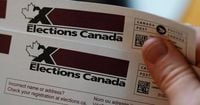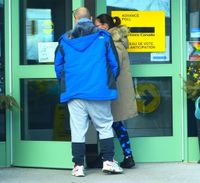As the federal election approaches, Canadians are hitting the advance polls in record numbers, with early voting witnessing a significant uptick across the country. This surge in participation comes as political leaders ramp up their campaigns, addressing pressing issues like inflation and public spending.
According to Elections Canada, nearly two million people cast their ballots on the first day of advance voting, April 18, 2025, marking a historic turnout. This record-setting participation reflects a growing engagement among voters, although some regions, such as the Northwest Territories, still struggle with low turnout rates.
In the Northwest Territories, voter turnout at federal elections has historically been among the lowest in Canada, with only 47 percent participating in the 2021 elections compared to the national average of 63 percent. Yet, on the first day of advance voting, officials reported about 200 votes at the Chateau Nova Hotel and another 150 at the Explorer Hotel in Yellowknife. One election worker noted that these numbers felt higher than in previous years, despite the pandemic's impact on voting behavior.
Meaghan Brackenbury, a voter at the Chateau Nova, expressed her commitment to participating in the election, stating, "It’s a right and a privilege and a responsibility to vote, so I wanted to do it while we had the time." Her companion, Alex Canuel-Kirkwood, echoed similar sentiments, emphasizing the importance of voting early to avoid lines on the official polling day.
In contrast, the situation in Inuvik was different, with one poll worker suggesting that many locals opted to enjoy a holiday jamboree instead of voting. However, some residents, like Patrick and Theresa, took advantage of the advance polls, citing concerns over national issues such as Arctic sovereignty and military readiness in the face of global tensions.
Julie Green, a former MLA in Yellowknife, also participated in the advance voting, highlighting her worries about affordability and social justice. She voted for the New Democratic Party's Kelvin Kotchilea, noting that the NDP has played a crucial role in holding the Liberal government accountable. Green stated, "I think the NDP played a really pivotal role in accountability for the Liberal government last time, and they were able to introduce programs that have a real impact on people – pharmacare and also the dental program."
Meanwhile, in southern regions like Bay of Quinte, advance polling was bustling. Voters expressed their desire for change, with many attributing their participation to dissatisfaction with the current government. Shawn Vickers, a shift worker, said, "I just want to make sure I take advantage of my chance to vote. I feel like it’s a wasted vote if I don’t vote." Tracey Derushie, a personal support worker, echoed this sentiment, emphasizing the need for better healthcare support and affordability for families.
As the advance voting period continues, political leaders are actively campaigning. Conservative Leader Pierre Poilievre kicked off his Sunday in Surrey, B.C., with a focus on inflation. He proposed cutting the federal budget for consultants by $10 billion, arguing that government overspending is a primary driver of inflation. "Inflation is what happens when governments spend money they don't have, so they just print the cash. More money bidding on a fixed supply of goods equals higher prices for everything," Poilievre stated.
Statistics Canada reported that the annual rate of inflation cooled slightly to 2.3 percent in March, although food prices continued to rise by 3.2 percent year over year. Poilievre criticized the Liberal government's platform, which proposes $129 billion in new spending over the next four years, suggesting it would exacerbate inflation.
Liberal Leader Mark Carney defended his party's approach, framing it as a necessary investment in Canada’s self-reliance amid ongoing trade tensions with the United States. He emphasized the importance of addressing economic challenges head-on.
As political discourse heats up, the New Democratic Party, led by Jagmeet Singh, is also expected to make announcements in British Columbia, while Carney is scheduled for events in Ottawa. The NDP recently unveiled its costed campaign pledges, aiming to resonate with voters concerned about social issues and economic stability.
Despite the varying levels of enthusiasm for voting across different regions, the overall trend indicates a heightened awareness and engagement in the electoral process. With advance voting set to continue until April 21, 2025, the momentum built during these initial days could influence the final turnout on election day, April 28.
As Canadians navigate the complexities of the current political landscape, their voices are increasingly being heard at the ballot box. Whether driven by local concerns or national issues, voters are taking their civic responsibilities seriously, underscoring the importance of participation in shaping the future of their communities and the country.








